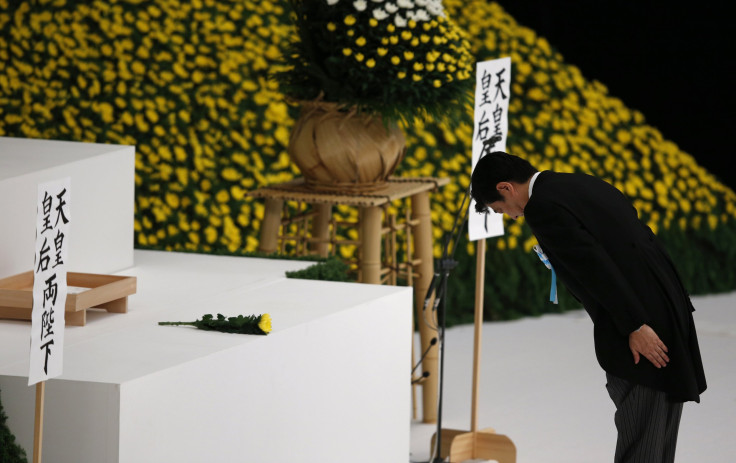Shinzo Abe’s Offering To Yasukuni Shrine Angers China, South Korea

Japan’s Prime Minister Shinzo Abe sent an offering to the controversial Yasukuni Shrine on Friday, while other Cabinet ministers also paid respects to the war dead on the 69th anniversary of Japan’s defeat in World War II, a move that has angered South Korea and China.
The shrine honors a number of convicted war criminals among other war dead, which has angered Japan’s neighbors, victims of Japanese aggression and atrocities in that era.
Abe did not visit the shrine himself but reportedly sent his offerings through his aide Koichi Hagiuda. Two Cabinet members -- Yoshitaka Shindo, internal affairs minister, and Keiji Furuya, chairman of Japan's national public safety commission, also visited the Tokyo shrine.
Abe’s visit to the shrine in December, the first by a prime minister since 2006, prompted criticism from Seoul and Beijing. According to Reuters, Abe's absence on Friday appeared to be an attempt to avoid aggravating tensions with the two neighbors over several issues -- including the territorial dispute over a set of islands in the East China Sea. Abe reportedly signed his offering as head of the ruling Liberal Democratic Party, and not as the prime minister.
"Only when Japanese politicians abandon their historical revisionism and repent for Japan's wartime atrocities sincerely, the relations between Seoul and Japan could be developed in a stable manner, as people in both nations hope," Noh Kwang-il, South Korean Foreign Ministry spokesman, said in a statement, Global Post reported, citing Yonhap, the Korean news agency.
Shindo reportedly said his visit to Yasukuni was a private matter, while Furuya said after his visit that it was "natural to pray for the souls of those who died for a country."
"I am a member of parliament but I am also a Japanese citizen, so while praying for world peace I offered my respects,” Furuya reportedly said.
According to the Associated Press, Abe said Friday that the soldiers' sacrifices brought “peace and prosperity” to Japan and “we will never forget that.”
South Korean President Park Geun-hye said, according to Reuters, that the acts by some Japanese politicians will further sow tensions between the two nations.
"The relationship between South Korea and Japan can be developed steadily when Japan solves these matters in the proper way, and then the two nations can sincerely celebrate the 50th anniversary of the normalization of diplomatic relations between the two countries next year."
© Copyright IBTimes 2024. All rights reserved.




















